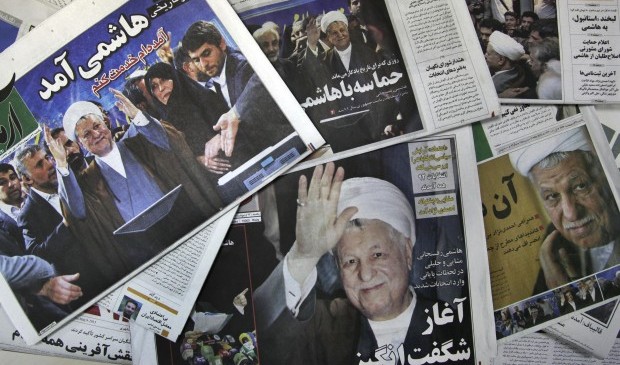
The front pages of the Sunday editions of Iranian newspapers, published with pictures of former president Akbar Hashemi Rafsanjani, a hopeful for the upcoming presidential election, are seen on Sunday, May 12, 2013. (AP Photo/Vahid Salemi)
London, Asharq Al-Awsat—Iranian culture minister Mohamed Hosseini will seek to tighten rules to supervise visiting foreign journalists, the semi-official Mehr news agency reported on Wednesday.
Hosseini was quoted as saying that tighter measures overseeing the activities of visiting foreign journalists are being sought after an Israeli journalist reported from Tehran about the 2009 presidential elections for a European news outlet.
The widespread post-election unrest in 2009 led the government to restrict access for visiting foreign journalists.
Hosseini revealed that 200 foreign journalists have applied to cover the presidential elections scheduled for June 14. The ministry has the final say on issuing credentials for foreign journalists.
Culture minister Mohamed Hosseini is a former member of the Iranian Revolutionary Guards Corps (IRGC) who served during the Iran–Iraq war.
Although a reported 120 foreign media outlets maintain offices in Iran, the Reporters Without Borders world report on Iran notes that the country “is now on the threshold of joining the ‘infernal trio’ [Eritrea, North Korea and Turkmenistan], the world’s most repressive countries in the domain of freedom of the press,” adding, “Iran has become the Middle East’s biggest, and among the five biggest prisons in the world for journalists.”
Last week, the organization, which defends freedom of information and freedom of the press, issued an open letter to the eight approved candidates squaring off in next month’s elections. Reporters Without Borders calling on the candidates “to free all imprisoned journalists and netizens and to ensure that Iran observes its international obligation to respect freedom of information,” adding, “these include the International Covenant on Civil and Political Rights, which Iran ratified in 1975.”
The open letter called on the candidates to commit themselves to a number of actions, including “demand[ing] the unconditional release of the 52 journalists and netizens who are today imprisoned in Iran,” and to “begin a fundamental reform of media law, aimed in particular at decriminalizing press law violations and guaranteeing freedom of information without discrimination based on language, religion, or political opinion.”
